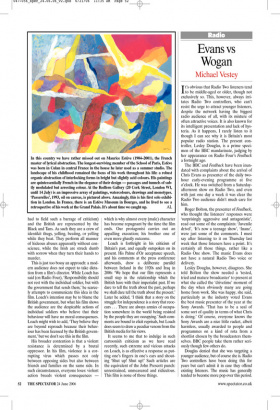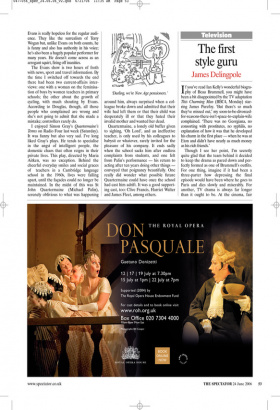Evans vs Wogan
Michael Vestey
It’s obvious that Radio Two listeners tend to be middle-aged or older, though not exclusively so. This, however, always irritates Radio Two controllers, who can’t resist the urge to attract younger listeners, despite the network having the biggest radio audience of all, with its mixture of often attractive voices. It is also known for its intelligent presentation and lack of hysteria. As it happens, I rarely listen to it though I can see why it is Britain’s most popular radio station. The present controller, Lesley Douglas, is a prime specimen of the BBC mandarinate, judging by her appearance on Radio Four’s Feedback a fortnight ago.
The BBC and Feedback have been inundated with complaints about the arrival of Chris Evans as presenter of the daily twohour early-evening programme at five o’clock. He was switched from a Saturdayafternoon show on Radio Two, and even with just one day a week it was clear the Radio Two audience didn’t much care for him.
Roger Bolton, the presenter of Feedback, who thought the listeners’ responses were ‘surprisingly aggressive and antagonistic’, read out some of the complaints: ‘Juvenile drivel’, ‘It’s now a teenage show’, ‘Inane’, were just some of the comments. I must say after listening to it on Thursday last week that those listeners have a point. It’s certainly all those things, rather like a Radio One show. The manic Evans does not have a natural Radio Two voice or delivery.
Lesley Douglas, however, disagrees. She told Bolton the show needed a ‘tested, tried and mature broadcaster’ to present at what she called the ‘drivetime’ moment of the day when obviously many are going home from work. She was happy, she said, particularly as the industry voted Evans the best music presenter of the year at the Sony Awards. ‘That has to be a seal of some sort of quality in terms of what Chris is doing.’ Of course, everyone knows the Sony Awards are a nice little racket, albeit harmless, usually awarded to people and programmes on a kind of rota from a shortlist chosen by the broadcasters themselves. BBC people take them rather seriously though few others do.
Douglas denied that she was targeting a younger audience, but of course she is. Radio Two controllers have been doing this for years but can’t admit it in case they offend existing listeners. The music has generally tended to become more pop over this period. Evans is really hopeless for the regular audience. They like the surrealism of Terry Wogan but, unlike Evans on both counts, he is funny and also has authority in his voice; he’s also been a hugely popular performer for many years. He doesn’t come across as an arrogant squirt, firing off inanities.
The Evans show is two hours of froth with news, sport and travel information. By the time I switched off towards the end there had been two current-affairs interviews: one with a woman on the feminisation of boys by women teachers in primary schools; the other about the growth of cycling, with much shouting by Evans. According to Douglas, though, all those people who complained are wrong and she’s not going to admit that she made a mistake; controllers rarely do.
I enjoyed Simon Gray’s Quartermaine’s Terms on Radio Four last week (Saturday). It was funny but also very sad. I’ve long liked Gray’s plays. He tends to specialise in the angst of intelligent people, the domestic chaos that often reigns in their private lives. This play, directed by Maria Aitken, was no exception. Behind the cheerful everyday smiles and social graces of teachers in a Cambridge language school in the 1960s, lives were falling apart, until the façades could no longer be maintained. In the midst of this was St John Quartermaine (Michael Palin), serenely oblivious to what was happening around him, always surprised when a colleague broke down and admitted that their wife had left them or that their child was desperately ill or that they hated their invalid mother and wanted her dead.
Quartermaine, a lonely old buffer given to sighing, ‘Oh Lord’, and an ineffective teacher, is only used by his colleagues to babysit or whatever, rarely invited for the pleasure of his company. It ends sadly when the school sacks him after endless complaints from students, and one felt from Palin’s performance — his return to acting after ten years doing other things conveyed that poignancy beautifully. One really did wonder what possible future Quartermaine could have once the school had cast him adrift. It was a good supporting cast, too: Clive Francis, Harriet Walter and James Fleet, among others.




















































 Previous page
Previous page